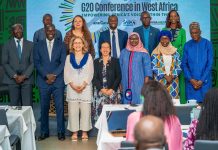By Thuku Kariuki
At the sidelines of the third UN Ocean Conference (UNOC3), Africa 21 Association talked with Dr. Chantal Line Carpentier, Head, Trade, Environment, Climate Change, and Sustainable Development, UNCTAD, who spoke about their role in sustainable ocean economies.

At the UNOC3, the Trade, Environment, Climate Change, and Sustainable Development branch of UN Trade and Development (UNCTAD) showcased its commitment to advancing sustainable ocean economies, particularly for developing countries.
With climate change posing significant risks to marine ecosystems, UNCTAD’s initiatives focus on leveraging trade opportunities while promoting environmental conservation and economic resilience. The branch’s representative outlined their multifaceted approach, emphasizing innovative solutions like non-plastic substitutes and data-driven strategies to empower developing nations.
UNCTAD’s sustainable ocean economy program is a cornerstone of its efforts, recognizing the ocean as both a sector of opportunity and vulnerability for developing countries.
“The program operates through five key units: trade and climate, trade and ocean economy, trade and biodiversity, national climate export strategy, and sustainable manufacturing and circular economy. These units address interconnected challenges, from climate impacts to biodiversity loss, while promoting economic growth,” said Dr. Chantal Line Carpentier, Head, Trade, Environment, Climate Change, and Sustainable Development, UNCTAD, adding that these principles prioritize compliance with environmental laws, biodiversity conservation, and sustainable livelihoods.
A significant focus of UNCTAD’s work is addressing the global plastic pollution crisis through non-plastic substitutes, particularly for developing countries.
“Non-plastic substitutes can come from bamboo, banana leaves, pineapple leaves,” the representative explained, highlighting the potential of agricultural byproducts in the circular economy. Often discarded and burned, these materials contribute to carbon dioxide (CO2) emissions, but could be transformed into sustainable packaging alternatives instead. Seaweed, in particular, was noted for its potential to replace plastic film in food trade, offering developing countries a competitive edge in global markets.
However, challenges remain, such as high tariffs on agricultural goods and stringent phytosanitary standards that could hinder trade in these substitutes. UNCTAD is tackling these barriers through technical cooperation and consensus-building.
“We’re helping several countries in Africa with their non-plastic substitute regulation,” Dr. Carpentier said, emphasizing science-based policymaking to support sustainable trade practices.
By developing databases on trade in ocean economies, non-plastic substitutes, and biodiversity, UNCTAD equips developing nations with critical data to navigate global markets. These efforts are complemented by initiatives like the Ocean Sustainable Strategy, piloted in Barbados and ready for broader rollout, which helps countries identify tradable species, meet sustainability standards, and foster regional collaboration.
Dr. Carpentier underscored the importance of addressing regulatory constraints to ensure fair trade. “Tariffs on agriculture are way higher than the tariff on industrial goods,” she noted, pointing out how this affects non-plastic substitutes.
UNCTAD advocates for a global standard, such as a codex for non-plastic materials, to reduce unfair trade restrictions and enhance market access for developing countries. This is particularly crucial for regions like East Africa, where plastic pollution is a pressing issue, and transitioning to sustainable alternatives is challenging due to economic constraints.
Beyond technical support, UNCTAD is fostering multilateral cooperation. At the conference, they supported the Ocean Action Panel and hosted sessions at a pavilion in the green zone, partnering with France, Portugal, Angola, and the UK to engage the public on issues like plastic substitution. These efforts align with ongoing negotiations under the Intergovernmental Negotiating Committee (INC) on plastic pollution, where UNCTAD has influenced the inclusion of non-plastic substitute language to support sustainable trade practices.
UNCTAD’s work extends to ensuring a just transition for countries reliant on plastic production, particularly those tied to fossil fuels. By advocating for reskilling programs and alternative economic opportunities, UNCTAD aims to mitigate the social and economic impacts of reducing plastic production.
Additionally, their collaboration with countries like The Gambia demonstrates how trade can be integrated into Nationally Determined Contributions (NDCs) to promote sustainable fisheries and renewable energy, creating jobs and adding value to exports.
Through these initiatives, UNCTAD is paving the way for developing countries to harness their ocean economies sustainably, balancing economic growth with environmental stewardship in the face of climate challenges.
Produced in partnership with Africa 21 Association






